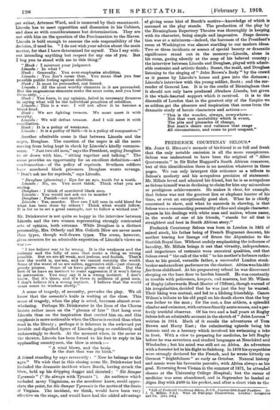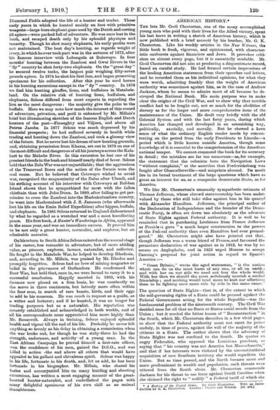FREDERICK COURTENAY SELOUS.*
MR. JOHN G. Mn r-cre's memoir of his friend is so full and frank that the only notable omission is oil the more conspicuous. Salons was understood to have been the original of " Allan Quatermain " in Sir Rider Haggard's South African romances, but of this identification there is no mention whatever in these pages. We can only interpret this reticence as a tribute to Seloua's modesty and his scrupulous precision of statement. Mr. Millais loved and admired his friend, but he is as scrupulous as Selma himself was in declining to claim for him any miraculous or prodigious achievements. lie makes it clear, for example, that Selous was not the greatest lion or elephant hunter of his time, or even an exceptionally good shot. What he is chiefly concerned to show, and what he succeeds in showing, is that Salons was a commanding personality of fine and simple character. square in his dealings with white man and native, whose name, in the words of one of his friends, "stands for all that is straightest and best In South African story."
Frederick Courtenay Salons was born in London in 1861 of mixed stock, his father being of French Huguenot descent, his mother tracing her lineage rid Bruce the Abyssinian to the Scottish Royal line. Without unduly emphasizing the influence of heredity, Mr. Millais brings it out that vivacity, independence, and impatience of restraint were ancestral qualities, and that Salons owed " the call of the wild " to his mother's forbears rather than to his genial, versatile father, a encomia! London stock- broker and excellent performer on the clarinet. Afrioa waa his We fire from childhood. At his preparatory school he was discovered sleeping on the bare floor to harden himself. He was constantly in trouble with policemen, keepers, and =eters, but Mr. Wilson of Rugby (afterwards Head-Master of Clifton), though warned of his irregularities, decided that he was just the boy he wanted. Their liking was mutual, and led to a lifelong friendship. Canon Wilson's tribute to his old pupil on his death shows that the boy was father to the man ; for the rest, a fine athlete, a splendid climber and swimmer, with extraordinarily acute senses, and a per- fectly truthful observer. Of his two and a half yearn at Rugby Seloua left an admirable account in the sketch of " John Leroux " written in 1914. Much of it recalls the adventures of Tom Brown and Harry Eaet ; the culminating episode being his historic: raid on a heronry which involved his swimming a lake in frost. With a view to preparing for medicine, he left Rugby before he was seventeen and studied languages at Neuchatel and Wiesbaden ; but his mind was still set on Africa. An adventure with a forester led to his flight to Salzburg. In 1870 his sympathies were strongly declared for the French, and he wrote bitterly on German " frightfulness " as early as October. Natural history and mush: were his favourite pursuits, with Africa always as his goal. Returning froni Vienna in the Bummer of 1871, he attended alassee at the University College Hospital; but the career of medicine was soon abandoned, and in September he landed at Algoa Bay with £400 in his pocket, and after a short visit to the • zwe of Freda tot Courtmay Moue, D.S.O., Captain MA Royal Fusilier,. Ity f. G. With le 7‘11-1.130 Illustrations. London Longman sad co. 1215. Data many delightful specimens of his own skill as an animal if wary of Um Coiled Staks. By Cecil aeeersee, draughteman. I ductIon be O. Cheaterton. voodoo: Matto sod Windus. Diamond Fields adopted the life of a hunter and trader. These early years in which he bunted mainly on foot with primitive weapons—large-bore elephant guns used by the Dutch and costing £8 apiece—were packed full of adventure. He was once lost in the bush, and escaped death only by his splendid physique and tenacity. Though be shot many elephants, his early profits were not maintained. The beat day's hunting, as regards weight of ivory, in which heaver took part was in the autumn of 1873, after his famous interview with Lobengula at Bulawayo. In four months' hunting between the Zambesi and Gwai Rivers in the " fly" country he shot forty-two elephants. On the "great day" he secured twelve tusks, the largest pair weighing fifty-seven pounds apiece. In 1874 he shot his first lion, and began preserving specimens for his collection. After this year he used horses in his hunting excursions except in the " fly " country. In 1878 we find him hunting giraffes, lions, and buffaloes in Matabele- land- On the relative risk of hunting lions, buffaloes, and elephants, Selous differed from most experts in regarding the lion as the most dangerous : the majority give the palm to the buffalo. Here we may note how much the interest of this record of adventure, privation, and peril is enhanced by Mr. Millais's brief but illuminating sketches of the famous English and Dutch hunters of the past—Finaughty and Viljoen, and above all Petrus Jacobs. In 1877 Selous was much depressed by his financial prospects; he had suffered severely in health while trading and hunting down the Zambesi, and took a gloomy view of the future. But he never last his dream of new hunting grounds. and, obtaining permission from 1Chama, set out In 1879 on one of the most difficult and dangerous of all his journeys across the Kala- hari to the Mababe River. In this excursion he lost one of his greatest friend's in the bush and himself nearly died of fever. Selous held that the Zulu War was not unjustifiable ; that the aggressions of the Transvaal Boers and the action of the Swazis were the real cause. But he believed that Cetewayo wished to avoid war, recognized the magnanimity of the Zulus after Ulundi, and his striking account of his interview with Cetewayo at Robben Island shows that he sympathized far moo with the fallen chieftain than with John Thum. In 1880, after failing to get per- mission to cross the Zambesi into the Mashukulumbwe country, he went into Mashonaland with J. 8. Jameson (who afterwards lost his life on the Erain Relief Expedition) after hippos, buffalo, and elephants. In 1881 Salons returned to England disheartened by what he regarded as a wretched war and a most humiliating pesos. His first book, A Hunter's Wanderings in Africa, appeared in the same year, and was an immediate success. It proved him to be not only a great hunter, naturalist, and explorer, but an admirable narrator.
On his return to South Africa Selous entered on the second stage of his career, less romantic in adventure, but of more abiding value, as pioneer, explorer, farmer, naturalist, and collector. He fought in the Matabele War, he helped to develop Rhodesia, and, according to Mr. Millais, was praised by Mr. Rhodes and promptly forgotten. Selous had no love of mining magnates or belief in the grievances of Outlanders. He condemned the Boer War, but held that once in, we were bound to carry it to a successful conclusion. Happily married in 1893, with his finances now placed on a firm basis, he was constantly on the move in three continents, but latterly more often within the four seas, in search of rare beasts, birds, and their eggs to add to his museum. He was much in request as a guide, as a writer and lecturer; and if he hunted, it was no longer for trading purposes but as a naturalist. His reputation was securely established and acknowledged in both worlds, and of all his correspondents none appreciated him more highly than Mr. Roosevelt. Always in training, Selous enjoyed splendid health and vigour till the end of his life. Probably he never felt anything so keenly as his delay in obtaining a commission when the war broke out, for though he was sixty-three he had the strength, endurance, and activity- of a young man. In the East African Campaign he proved himself a first-rate officer, won the confidence of his men, gained the D.S.O., and was killed in action -the end above all others that would have appealed to his gallant and chivalrous spirit. Selous was happy in his life, fortunate in his death, and, let us add, he has been fortunate in his biographer. Mr. Millais, who shared his tastes and accompanied him on many hunting and shooting excursions, has written a most engaging memoir of the great- hearted hunter-naturalist, and embellished the pages with



































 Previous page
Previous page